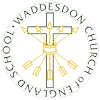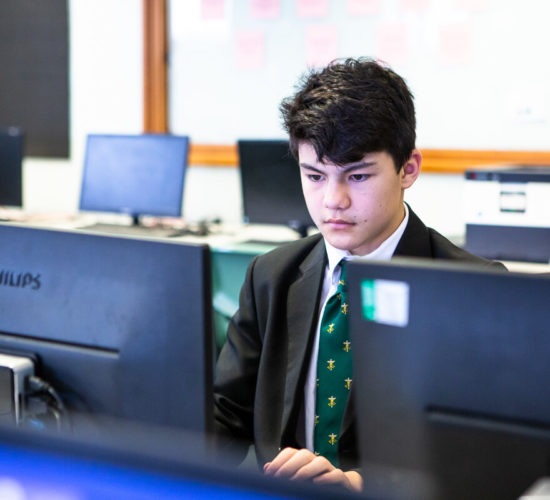
Our daily routines and educational practice are rooted in the twin values of Dignity and Respect.

Computing & IT at Waddesdon can be broken down into two main strands. The first one focuses on the core science elements of technology and explores the inner fundamentals with regard to how technology functions. This discipline is more commonly known as Computer Science. It is where pupils gain an insight into all kinds of computer systems. Computational thinking influences a diverse range of academic fields such as Mathematics, Sciences, Linguistics, and Psychology. It enables us to solve problems, design systems with the scope of abstracting problems, designing solutions using programming and synthesizing algorithms. The objective of teaching computational thinking is to instill in pupils the ability to understand and use computer-based concepts and technology.
The second strand, also known as Information Technology, not only covers knowledge and skills necessary to turn students into effective users of technology, but also emphasises the digital literacy element of Computing. It goes beyond teaching digital skills and encompasses more critical aspects around the responsible application of technology. This includes handling and storing information, creating content, and communicating this appropriately in a real-world context. Learners also become aware of how to use technology safely and respectfully, along with ethical and moral implications of its use.
It is therefore of huge benefit to learners that they study Computing at Waddesdon as it ensures they develop the necessary skills and expertise for computer systems, fundamental to flourishing in the 21st century.
Ms Cheryl SpittlesSubject Leader for Computing & IT |
Mr Yousaf AmirComputing & IT Teacher |
Mr Avnish MajethiaComputing & IT Teacher |
At Waddesdon School, we believe that our students should have the knowhow to follow an IT and Computing curriculum that prepares them to take advantage of the opportunities which have arisen due to the enormous demand of computer-enabled technologies being employed in all sectors of Britain and the wider world economy.
Our intention is that the Computer Science and IT knowledge and skills we provide to our students gives them an understanding of the subject in the wider schemes of things. They not only understand the fundamentals of the subject but also its application in society. We see that with this understanding they will develop the confidence to eventually pursue a career in which they not only contribute meaningfully to their communities but also enjoy what they are doing.
To ensure this possibility, the curriculum road map for Computing embeds latest pedagogical principles such as PRIMM, unplugged learning and many more. These are underpinned by research and ongoing CPD to ensure that the curriculum offered is broad, balanced and addresses gaps in prior knowledge from Key Stage 2.
In Year 7, the start of the academic year, a key priority is that students develop good levels of self-confidence and gain an understanding of essential software that is necessary to engage with the Computing & IT curriculum. In addition to this, to support and develop participation of digitally disadvantaged students. In order to do this, students are initially taught how to use technology safely and responsibly and, as a result, by modelling digital skills and through participation in project-based tasks, students ultimately cover the core set of Microsoft Office 365 apps. This facilitates digital literacy and integrates with other subjects in terms of improved communication, collaboration and presentation of work using applied information technology.
As students progress through to the second half of the academic year, they are made aware of the production and development side of computer technology. They explore how technological advancements from big software giants have helped in making a positive impact on humanity. Students are taught essential computational thinking and logical problem-solving skills, where they learn key programming skills using a block level language through a platform called Scratch. This is vital to developing foundations to professional textual-based programming. In addition, this conveys the importance of how logical reasoning and algorithmic thinking essentially play a crucial role in tackling world crisis situations that we currently face. Some examples include world hunger, global pandemic and disaster relief operations. Students are taught essential programming structures, which help them complete mini programming projects and this leads towards mobile app development in Year 8 . In order to develop digital literacy further and an analytical mindset, students are delivered a mathematical modelling unit, which requires them to use spreadsheet software to abstract scientific models. They carry out ‘what if’ analysis to forecast outcomes, such as the percentage of wildlife becoming extinct if the issue is not addressed early on. This is crucial towards becoming a data scientist and meeting the rigorous demands of current employment sectors.
In Year 8, further coverage of the curriculum takes place through the scope of practical computing. Students essentially learn about the physical engineering and design principles of computer systems which is crucial to understanding how modern chipsets operate and carry out the processing of data in the form of visual graphics, sound and text information. In order to embed this successfully in lessons, students are taken through several in-class demos of modern desktop computers, which are disassembled using simulation and actual examples. Students have the opportunity to piece parts together and explore the purpose of each individual component. Students are given further opportunities to explore this by looking at the history of modern computing. They do so by involvement in a number of trips, such as visiting Bletchley Park, which has gained positive feedback from students. Students have been quite fascinated by the remarkable changes that have taken place over the course of the last century and how technology has moved a long way in terms of its functionality and performance.
Students are often intrigued by how a computer chip, essentially an electric circuit, operates in appliances and machinery. In order to gauge their interest, a unit on binary logic is taught, during which they discover how a processor is able to make logical decisions on a fascinating scale of a billion operations per second. Students learn about the binary number system and how only two numbers could potentially translate into an enormous range of complex information.
In order to reinforce computational thinking and advance programming skills, students are introduced to a hands-on unit on mobile app development, giving them not only the chance to design an actual phone application, but also to explore the software development cycle, keeping in mind how real-world clients have certain requirements and how these are converted to technical specifications and eventually turned into the end product that is used by the client.
In Year 9, students begin their optional courses, and it is therefore crucial for them to develop good habits and techniques that could prepare them for the demands set by the curriculum specification. GCSE Computer Science students are given the opportunity to develop their computational thinking skills further and learn about this process in more depth. They cover the four stages critical to solving computing problems. These include abstraction, pattern recognition, decomposition and, finally, writing algorithms. Students realise that the software industry is quite dynamic, and as consumer demands are rapidly changing, so are development technologies. It is therefore not always practical to learn multiple programming languages. It is more important for students to develop knowledge of writing pseudocode, which is a universal way of communicating ideas, for example, how a certain program is supposed to behave. This gives a great edge to computing professionals since they can invest more time in creativity and functionality aspects of developing great products. This skill is essentially crucial to planning and design aspects of the programming project students complete in Year 10 and Year 11.
The same approach is applied in Creative iMedia. Students gain preliminary knowledge needed to create digital media products. As most of the course is practical and revolves around various stages in developing digital media products, students learn essential pre- production skills that are necessary to produce any digital media products such as a magazine cover, a film poster or a video advert. In pre-production tasks, students gain an understanding of how to effectively develop and deliver digital media products to the client, which meet their needs. As a result, students familiarise themselves with various documentation, which aids in understanding client requirements, and helps convert an initial concept into a design, before finally turning it into the end product. When students continue to Year 10 and Year 11, they can apply these skills in set assignments. These are found to be quite engaging, as per student voice, and also match the demands of the Creative Media industry.
In Year 10 and Year 11, students follow the prescribed curriculum pathway, and develop revision techniques and strategies which enable them to effectively answer exam-style questions, along with completing the practical coursework-based elements of the course.
At Key Stage 5, students are given the opportunity to pursue the Cambridge Technical qualification, studying course units that enable them to become skilled practitioners in emerging digital technologies. This pathway focuses on the use and development of virtual and augmented reality and emerging technologies for application across a range of sectors, to include mobile technology, digital marketing and the visualisation of big data. This path is intended for students who wish to develop critical skills necessary to function in a business environment, but also to gain technical skills necessary to deliver projects successfully. One of the many positive elements of the course is the aspect of employer involvement. Students would gain work experience in some form or capacity, which would require them to collaborate with a real client and facilitate their project. Ideally the project or task students would carry out would reinforce skills acquired during the course. This course would certainly widen participation due to its vocational nature but, at the same time, ensure that students have developed transferable skills that are highly regarded by employers and universities.
Students are taught the following topics in Year 7:
Topic 1 – Impact of Technology – Collaborating Online Respectfully
Students are given sufficient time to familiarise themselves with the school network. They also focus on respecting others online, spotting strangers, and the effects of cyberbullying.
Topic 2 – Using Media – Gaining Support for a Cause
Students will develop software formatting skills and explore concerns surrounding the use of other people’s work, including licensing and legal issues.
Topic 3 – Computer Networks
Students will develop an understanding of the terms ‘internet’ and ‘World Wide Web’, and of the key services and protocols used.
Topic 4 – Programming Essentials in Scratch
The main programming concepts covered in this unit are sequencing, variables, selection, and count-controlled iteration.
Topic 5 – Programming Essentials 2
Students will learn how to create their own subroutines, develop their understanding of decomposition, learn how to create and use lists, and build upon their problem-solving skills by working through a larger project at the end of the unit.
Topic 6 – Programming – Physical Computing with the BBC Micro:bit
Students will learn about the hardware used to make the micro:bit and then apply the programming concepts and skills learnt in previous units, on the micro:bit to design activities and games, using an online code editor.
Students are taught the following topics in Year 8:
Topic 1 – Computer Systems
This unit takes students on a tour through the different layers of computing systems, from programs and the operating systems, to the physical components that store and execute these programs, to the fundamental binary building blocks that these components consist of.
Topic 2 – Data Representation
Students are gradually introduced to binary digits and how they can be used to represent text and numbers.
Topic 3 – Programming Mobile App Development
This unit aims to take the students from designer to project manager to developer in order to create their own mobile app.
Topic 4 – Introduction to Text-Based Python Programming
The unit starts with simple programs involving input and output, and gradually moves on through arithmetic operations, randomness, selection, and iteration.
Topic 5 – Data Modelling Using Spreadsheets
Students will be able to confidently model data with a spreadsheet. This will include knowing how to use formulas and functions.
Topic 6 – Computer Ethics, Law and E-Safety – Ready Player One
Students will develop a sound understanding of the moral, legal, and ethical issues that have arisen or might arise from technology use now and in the future.
There are currently two pathways at Key Stage 4 available to students, which consist of the following courses below:
GCSE Computer Science
Students are taught the following topics in Years 9 to 11:
The OCR GCSE Computer Science comprises the following two externally assessed written exams:
Component 01 – Computer Systems (50%)
The first component is an exam focused on computer systems, covering the physical elements of Computer Science and the associated theory.
This consists of the following units below:
Component 02 – Computational Thinking (50%)
This component is focused on the core theory of Computer Science and the application of Computer Science principals.
This consists of the following units below:
Cambridge Nationals in Creative iMedia
Students study two mandatory units. These are:
Students would pursue two Optional units:
Cambridge Technicals Level 3 in IT – Introductory Diploma
Students are taught the following topics in Year 12 and Year 13 as part of their course:
Year 12
Two exam-based units (externally assessed):
Year 13
Three coursework-based units (internally assessed):
All students within the department are entered annually for the Bebras Computational Thinking competition hosted by the University of Oxford in October. Students who achieve in the top 10% of the country are then automatically entered into an additional programming round in February.
In Year 8, our more able girls are invited to take part in CyberFirstGirls competition to enhance their knowledge of cyber security and to encourage more females onto our courses at KS4.

Waddesdon Church of England School’s Assessment and Feedback Policy. At Waddesdon our aim is for assessment to be:
